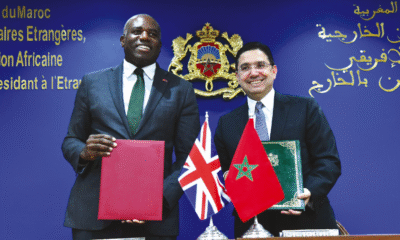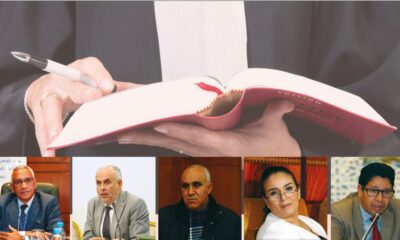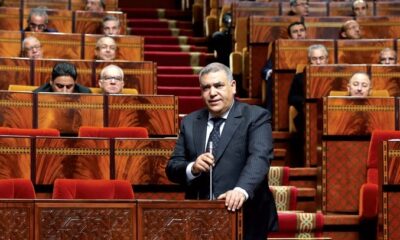Kingdom
Social Dialogue: Imminent Resumption Amid Escalating Union Tensions
Social partners are set to convene for a new round of negotiations this April—and not without reason: mounting union discontent. As a result, the three parties must finalize the social reform agenda, including overhauling the pension system, among other urgent priorities.

Weeks before the resumption of social dialogue as part of a new round in April, the UMT (Moroccan Labor Union) has set the tone. Meeting for the first time after its 13th Congress, the union’s national secretariat was unequivocal: “Due to systemic failures—including unmet prior commitments, a lack of political will and good-faith negotiations, and the absence of legal institutionalization for dialogue—social dialogue in Morocco has become obsolete and devoid of purpose.”
The union is referring to the same process that led to the April 29, 2024 agreement, earlier accords, and a series of social pacts across public sector domains. Less than a year ago, the three social partners finalized an agreement with specific commitments for each party.
This agreement included concrete actions pledged by the government and employers to boost purchasing power for civil servants and private-sector workers. Consequently, the government approved a two-phase salary increase of 1,000 dirhams for civil servants.
The first phase took effect on July 1, 2024; the second is scheduled for three months later. Notably, public sector spending will rise from 140 billion dirhams in 2021 to 192.9 billion dirhams by 2026—a 37.3% increase overall, equivalent to an annual rise of approximately 6.5%. The net minimum wage in the public sector, previously around 3,000 dirhams, has risen to 4,500 dirhams, marking a 50% increase.
For the private sector, social partners agreed to raise the SMIG (Minimum Interprofessional Guaranteed Wage) and SMAG (Agricultural Minimum Wage) by 10% in two phases: January 1, 2025, and January 1, 2026, for the SMIG, with the first SMAG increase effective this April and the second a year later.
In industry, commerce, and services, the net monthly SMIG rose from 2,638.05 dirhams (14.81 dirhams/hour) before this government’s tenure to 3,045.96 dirhams (17.10 dirhams/hour) as of January 1, 2025. It was incrementally raised to 2,769.87 dirhams in 2022, 2,901.68 dirhams in 2023, and will reach 3,045.96 dirhams in 2025—a total 15% increase between 2021 and 2025.
Similarly, the net monthly SMAG (Agricultural and Forestry Minimum Wage), which stood at 1,859.79 dirhams (76.7 dirhams/day) prior to this government, increased to 2,046 dirhams in 2022, 2,148 dirhams in 2023, and will reach 2,255.03 dirhams in 2025—a cumulative 20% rise between 2021 and 2025.
Commitments Kept
Simultaneously, since January 1 of this year, the Income Tax (IR) brackets have been restructured, with an added benefit (not stipulated in the April 29 agreement): a full IR exemption for pensions and lifelong annuities under basic retirement schemes, at a cost of approximately 1 billion dirhams.
The total cost of the IR reduction reform amounts to 8.6 billion dirhams. By 2025, the cost of social dialogue measures will reach 20 billion dirhams and rise to 45 billion dirhams by 2026.
Additionally, family allowances have been increased, and the National Social Security Fund (CNSS) has been reformed to allow retirees who have not accumulated the required 3,240 points by their retirement date to receive a pension. This measure recently came into force after approval at the latest CNSS board meeting.
Retirees with at least 1,320 points are now eligible for pensions ranging from 600 to 1,000 dirhams. These measures impact 4.25 million civil servants and private-sector employees, in addition to hundreds of thousands of retirees. So far, the government and employers have upheld their commitments. But what about the unions?
In early 2025, the UMT (Moroccan Labor Union) and CDT (Democratic Confederation of Labor) expressed dissatisfaction, particularly regarding the strike regulation law recently validated by the Constitutional Court in March 2025, albeit with reservations tied to its implementing decrees.
The organic law, adopted over nearly two years with union involvement (including non-representative unions), is widely seen as curtailing union rights, reigniting tensions. This culminated in a nationwide strike declaration ahead of its parliamentary vote.
Protests and work stoppages—endorsed by the CDT—denounced a “lack of consultation” and “unmet commitments.” In healthcare and education sectors, despite earlier salary increases, strikes resumed over “unfulfilled promises.”
A Firm Social Agenda
Consequently, the second point of the social agreement remains unaddressed. Despite Economy and Finance Minister Nadia Fettah Alaoui’s announcement in January of renewed discussions on pension reform with specific proposals, no progress has materialized.
While it is understandable that the government prioritized finalizing a consensual organic law on strike regulations (the agreement’s second point), the pension reform process should already be underway. At this stage, government proposals—including increased contributions, a higher retirement age, and reduced pensions—face mounting resistance. Unions fear an erosion of workers’ rights, and delays in finalizing the reform have complicated negotiations. The upcoming round of social dialogue, starting in days, will thus be critical.
It will focus on finalizing pension system reforms, aiming to expand coverage by 2025 to workers without pensions. This is not only a commitment the government insists on fulfilling but also part of the social agenda announced during the legislative session’s opening speech on October 9, 2020, which set 2025 as the target for universalizing social protection.
Framework Law 09-21 on social protection, enacted in March 2021, specifies that the reforms will involve “expanding pension scheme enrollment and universalizing unemployment benefits by 2025.”
Beyond ensuring pension fund sustainability through convergence into public and private regimes, the reform aims to extend coverage to working individuals without pensions. The law clarifies this will occur “via full rollout of pension schemes for professionals, self-employed workers, and non-salaried liberal professionals.”
Subsequently, the government will work on establishing unemployment benefits (to be universalized for all stable workers) as part of labor law reforms negotiated with social partners. Per the April 29 agreement, this includes overhauling vocational training, labor codes, and the electoral framework for professional elections.
In summary, while social dialogue has progressed toward institutionalization and delivered tangible social gains for employees, civil servants, and retirees, it remains hampered by disputes—sometimes unjustified—between unions and the government.













